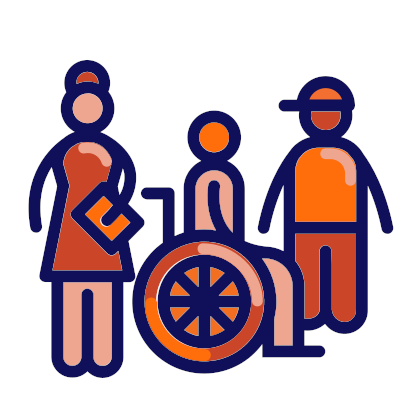Tackling discrimination

Schools can tackle discrimination by promoting democracy, respect for human rights and citizenship.
To ensure that all students’ needs are met equally, schools need to prioritise language and cultural competences, multiperspectivity in history and gender equality. In this way, students can acquire competences for democratic culture, to fulfil their potential in school as well as in society.
Facts & figures
Students with disabilities in Europe have higher early-school leaving-rates than their same-age peers.[1]
Black Caribbean students are three times more likely to be excluded from English schools than white pupils. [2]
A survey of nine EU countries showed that 33% of Roma students were in schools where most pupils were Roma, with 13% in Roma-only schools.[3]
What is discrimination?
Discrimination is treating a person badly or unfairly on account of a personal characteristic, such as national, ethnic or social origin, gender, language, religion, disability or sexual orientation.
There are two basic forms of discrimination:
- Direct discrimination – treating someone less favourably than you treat or would treat another person in the same situation, e.g., a school refusing to admit a student because they are Roma,
- Indirect discrimination – applying a provision, criterion or practice in the same way for all of a group which has the effect of unfairly disadvantaging people in the group who share a particular characteristic, e.g., a school uniform policy banning headgears for girls and boys may unfairly disadvantage Muslim girls and Jewish boys.
Discrimination can occur in almost any aspect of school life, from the attitudes and expectations of teachers to school rules and codes of conduct, selection and grouping practices, curricula, teaching methods and materials, changing facilities, career guidance, canteen food and the physical school environment.
Whatever form it takes – whether it be parallel school systems for different ethnic groups, concentrations of minority or disadvantaged children in the same school, or differential access to educational provision, it means a lower quality of educational experience for the students being discriminated against.
Why is tackling discrimination important at school?
Discrimination is a human rights violation. Article 14 of the European Convention on Human Rights contains a prohibition on discrimination with respect to any of the rights and freedoms guaranteed under the Convention. Article 2 of Protocol No.1 requires the state to ensure that all individuals have access to its formal educational provision.
“No person shall be denied the right to education.”[4]
“The enjoyment of the rights and freedoms set forth in this Convention shall be secured without discrimination on any ground such as sex, race, colour, language, religion, political or other opinion, national or social origin, association with a national minority, property, birth or other status.”[5]
Tackling discrimination is not simply a duty laid on schools by the European Convention of Human Rights, it is also important for student well-being and educational success. Children and young people who are treated unfairly or discriminated against are more likely to have:
- negative attitudes to school
- lower levels of motivation and academic achievement
- a higher risk of dropping out of formal education
- experience of bullying
- mental health problems.
Feeling different or ‘less’ than others can be an isolating experience. Over time it undermines an individual’s capacity for participation in society, e.g., their sense of self-efficacy, openness to other cultures and beliefs, tolerance of ambiguity and flexibility and adaptability - all of which lie at the heart of the Council of Europe Reference Framework of Competences for Democratic Culture.
Lack of opportunity due to discrimination in school also damages society. It intensifies social divisions, fuels xenophobia and intolerance and undermines social cohesion.
“States should adopt a combination of strong anti-discrimination measures and policies that promote more inclusive education systems where all children learn together. This is not a utopian project, but an achievable goal that can ensure more equal treatment of all children and, in the long term, improve social cohesion”[6]
What are the challenges?
One of the challenges facing the tackling of discrimination in schools is a lack of data. European-wide statistics specifically focused on discrimination in schools are scarce. Children with disabilities, for example, do not always appear in national statistics and may be ‘invisible’ to decision-makers, service providers and the public. Such children are particularly vulnerable to discrimination, however, and are often segregated in terms of educational provision.
These are not the only ‘invisible’ minorities in schools. For example, LGBTI students often feel they have to hide their sexual orientation at school to avoid victimisation.
Another key challenge is the existence of negative stereotypes about minority groups among teachers, parents, students and other school stakeholders. Such stereotypes are often deeply embedded in everyday school life and practice, so much so that they are taken as ‘normal’, e.g., stories and images in textbooks that reflect a stereotyped portrayal of the roles of women and men, girls and boys. Stereotypes help to fuel prejudiced and aggressive behaviour between students, lower expectations from teachers and negative attitudes from parents, e.g., refusing to allow their children to be taught alongside refugee or migrant children.
Stereotyping is difficult to root out in schools because its origins lie in wider society. This is exacerbated by the current preponderance of hate speech, fake news and conspiracy theories in digital media, especially social media.
The situation is compounded when minority groups are under-represented on school staff. Students lack role - models and teachers do not have the access to information about or insights into other cultures and ways of life that come with belonging to a more diverse profession. They lack the intercultural competences with which to create inclusive and quality learning environments, e.g., openness to cultural otherness, tolerance of ambiguity, plurilingual skills and knowledge and critical understanding of alternative cultures, religions and histories.
Tackling discrimination is more challenging when there is a lack of dialogue between schools and parents. Often this is on account of language difficulties, but it is also a problem where students’ parents work abroad leaving their children in the charge of elderly relatives or others.
How can schools get active?
Ensuring all learners of any age are provided with meaningful, high-quality educational opportunities alongside their peers requires a whole-school approach.
It begins by schools understanding who might be at risk of discrimination, what they can do to minimise discrimination and how they can support students at risk of discrimination. A good place to start is with an assessment of the current situation, identifying the strengths that exist in the school, but also needs and priorities. Consulting with school stakeholders is essential, especially students and, where possible, parents – e.g., using surveys, questionnaires, focus groups, etc. Given the sensitivities involved there is argument for collecting information on individuals’ experiences of discrimination anonymously.
Based on an assessment of the current situation it is possible to identify immediate priorities for policy development. Priorities will vary with the school, but might include, for example:
- language development
- gender equality
- accessibility of the physical environment
- intercultural competences.
The setting of initial priorities should go hand in hand with professional development for senior leadership teams as well as teaching staff. An element of personal as well as professional reflection is essential to the tackling of discrimination in school. In particular, it is important for school staff to be able to consider their own beliefs and values with regard to discrimination, including their own unconscious biases and prejudices.
Schools can then turn to the longer-term aspiration of creating a culture of non-discrimination. Central to this process is the challenging of negative stereotyping, both in classrooms and around the school. This can be done in a variety of ways, including:
- challenging stereotypes when they are heard
- discussing stereotypes with students
- identifying stereotypes in the curriculum
- highlighting stereotypical images and roles in textbooks
- allocating posts of responsibility equitably
- choosing different ways of dividing up students
- providing a range of role-models
- setting up mechanisms for monitoring incidents of discrimination.
Challenging stereotypes goes alongside the promotion of inclusion and an appreciation of the benefits of diversity in school life. This can take different forms, including:
- using inclusive language
- including human rights, democratic citizenship and intercultural education in the curriculum
- encouraging the discussion of controversial issues
- promoting student voice
- involving students in peer education and peer mediation activities
- welcoming parents and involving them in school decision-making
- forming partnerships with different organisations and groups in the community.
[1] Education section of the The European Disability Forum
[2] Article: UK: Racial discrimination is a reality in schools and classrooms. Education International
[3] EU Fundamental Rights Agency, “Second European Union Minorities and Discrimination Survey (EU-MIDIS II) Roma – Selected findings” (2017).
[4] ECHR, Article 2, Protocol No.1
[6] Position paper: Fighting school segregation in Europe through inclusive education by the Council of Europe Commissioner for Human Rights
 Resources on Tackling discrimination
Resources on Tackling discrimination
 Related schools projects
Related schools projects
Address:
Country: England, United Kingdom
Project: Embedding Whole-School Student Voice
 Working language during the project:
Working language during the project:
- English
 Themes of the Council of Europe campaign “FREE to SPEAK, SAFE to LEARN - Democratic Schools for All” covered:
Themes of the Council of Europe campaign “FREE to SPEAK, SAFE to LEARN - Democratic Schools for All” covered:
- Making children’s and students’ voices heard
- Addressing controversial issues
- Preventing violence and bullying
- Dealing with propaganda, misinformation and fake news
- Tackling discrimination
- Improving well-being at school
 Competences from the Reference Framework of Competences for Democratic Culture (CDC) addressed and where / how they were integrated:
Competences from the Reference Framework of Competences for Democratic Culture (CDC) addressed and where / how they were integrated:
- Respect
At the heart of this project is the value of respect for self, respect for others and respect for education. Through the project we will establish a clear set of respect protocols to ensure that all students are able to fully participate and contribute to discussions in a safe and respectful environment. - Valuing human dignity and human rights
Teaching of Human Rights education through our Citizenship, PSHCE and Holistic Curriculum will form an essential basis of this project. - Empathy
All students will have a series of taught and skills development sessions on the value of empathy and how to develop it. These will consist of assemblies, taught sessions through the PSHCE curriculum and key workshops.
 Target group age range:
Target group age range:
- 11-15
- 15-19
 Level of education:
Level of education:
- Lower secondary education
- Upper secondary education
Short description of the project:
This project aims to build a fully democratic and inclusive school where all students are represented in democratic processes and have a voice in shaping the ethos and principles of the school. This will incorporate student representation at Local Governing Body and Leadership level, in policy review processes and through Student Leadership and School Council activities. Staff and students will work together to establish the core principles of our democratic school and these will be clearly communicated, both internally and externally, as fundamental to the school’s ethos. An Equality and Diversity Group will be established and will meet six times per year. This will be an open access group where all students within the school community have an opportunity to fully participate.
A number of key events will be established and delivered on an annual basis. These will include:
- A Question Time event where students will form part of the panel alongside Members of the British Parliament.
- The school will establish ongoing debating activity and discussion groups and will commit to entering teams in Debating and Mock Trial events.
- Linking activities such as ‘Carry My Story’ and the ‘Journeys Project’ where students are able to connect to community organisations and to other schools in order to develop their knowledge and understanding of the world.
All students in the school will also participate in a ‘mock General Election’ event to coincide with the UK General Election on 12th December. This will include delivery of taught lessons for all students on the democratic process and the UK electoral system. All students will have an opportunity to discuss and debate the policies of the different parties and will participate in a voting exercise on Election Day.
In addition, our Environmental Action Group of students will continue to run their campaign and we will commit to supporting and facilitating this wherever possible. We will also help to empower a number of other nascent student action groups including ‘Votes at 16’ and ‘Women and Leadership’.
We will work with a number of key partners to support this work and to enable our students to engage at a local, regional, national and international level. These will include six Universities, The British Council, The UK in a Changing Europe, Young Citizens, NECE and any other organisations who are willing to engage with our young people and add value to our work.
A steering group will be established to drive this agenda forward – this will consist of Student Representatives, Governor Representatives, members of the School Leadership Team and key members of staff.
 Aims/objectives
Aims/objectives
- To embed student representation at all levels of decision making.
- To empower students to have a sense of ownership of their school and to enable all students to make a contribution to the current and future direction of the school.
- To enable all students to feel included, safe and respected within the school community.
- To enhance our students understanding of local, regional, national and global contexts, debates and issues.
- To ensure that all our students have a voice and are confident that they are able to make a contribution.
 Expected results/outcomes
Expected results/outcomes
We would anticipate that our students feel increasingly empower and engaged and have a greater sense of autonomy and ownership over their capacity to learn, engage and change. We would also expect that all our students feel that they have improved their knowledge and awareness of political and democratic processes in the UK. We will collect data at the start and end point to ascertain whether we have established a culture change through this initiative.
 Changes
Changes
As outlined above, increased structural and systematic representation of student voices.
 Challenges you faced
Challenges you faced
This is a major, whole-school initiative which will require energy and commitment from all stakeholders. We will also need to have a clear communication strategy which includes all members of our school community, parents and families and a number of key external partners.
 Time-frame of the project:
Time-frame of the project:
- November 2019 to July 2021
 Council of Europe materials on citizenship and human rights education used while preparing or implementing your practice:
Council of Europe materials on citizenship and human rights education used while preparing or implementing your practice:
- Reference Framework of Competences for Democratic Culture
- Living Democracy - manuals for teachers
- Democratic governance of schools
- Addressing violence in schools through EDC/HRE
- All Different – All Equal
- Managing controversy
- Teaching controversial issues-training pack
- Human Rights and Democracy Start with Us – Charter for All
- How all Teachers Can Support EDC/HRE: A Framework for the Development of Competences







